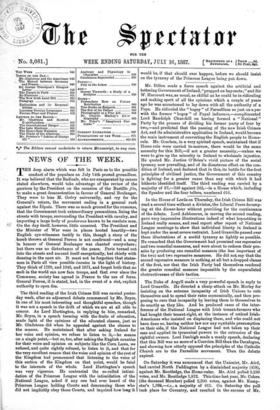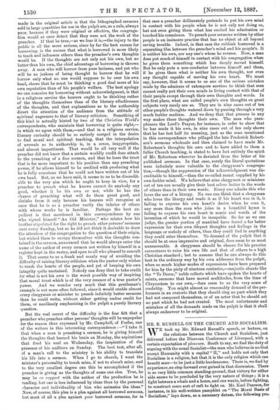On Saturday it was announced that the Unionist, Mr. Aird,
had carried North Paddington by a diminished majority (418), against Mr. Routledge, the Home-ruler. Mr. Aird polled 2,230 votes, and Mr. Routledge 1,812. This time last year, Mr. Cohen (the deceased Member) polled 2,300 votes, against Mr. Kemp- ster's 1,389t—i.e., a majority of 911. On Saturday the poll took place for Coventry, and resulted in the success of Mr.
made in the original article is that the lithographed sermons sold in large quantities for use in the pulpit are, as a rule, always poor, because if they were original or effective, the congrega- tion would at once detect that they were not the work of the preacher. If that be true,—as we fear it is,—the injury to the public is all the more serious, since by far the best excuse for borrowing, is the excuse that what is borrowed is more likely to teach and influence others than the preacher's own thoughts would be. If the thoughts axe not only not his own, but no better than his own, the chief advantage of borrowing is thrown away. A man who will borrow from pure laziness, and yet who will be so jealous of being thought to borrow that he will borrow only what no one would suppose to be over his own head, shows that he must be thinking a good deal more of his own reputation than of his people's welfare. The best apology we can conceive for borrowing without acknowledgment, is that in a religious service the hearers ought to be thinking rather of the thoughts themselves than of the literary effeetiveness of the thoughts, and that explanations as to the authorship divert the attention of the audience from the attitude of spiritual eagerness to that of literary criticism. Something of this kind is actually hinted by two of the Christian World's correspondents, who maintain that borrowing is quite right,— in which we agree with them,—and that in a religions service, literary curiosity should be so entirely merged in the desire to find moral and spiritual teaching, that the interpolation of avowals as to authorship is, in a sense, inappropriate, and almost impertinent. That would be all very well if the preacher did not know that a certain worldly credit does attach to the preaching of a fine sermon, and that he loses the trust that is far more important to his position than any preaching power, if he allows himself to be credited with producing what he is fully conscious that he could not have written out of his own head. But, as we have said, it seems to us to be discredit- able to the very aim which he ought to keep in view, for a preacher to preach what he knows cannot do anybody any good, whether it be his own or not, while he has the chance of preaching what will do them great good, and shrinks from it only because his hearers will recognise at once that he is as a preacher vastly the inferior of others with whose works he is familiar. Perhaps the best ex- pedient is that mentioned in this correspondence by one who signed himself "An Old Minister," who relates how his brother stipulated for the right to preach other persons' sermons once every Sunday, bat as he did not think it desirable to draw the attention of the congregation to the question of their origin, but wished them to occupy themselves with the thoughts con- tained in the sermon, announced that he would always enter the name of the author of every sermon not written by himself in a register kept in the vestry, and open to all who pleased to consult it. That seems to us a frank and manly way of avoiding the difficulty of raising literary criticism when the pastor only wishes to reach the hearts of the people, and yet of keeping his own integrity quite unstained. Is.:obody can deny that to take credit for what is not his own is the worst possible way of inspiring that moral trust which is of the very essence of a true pastor's power. And we wonder very much that this gentleman's example is not more often followed, since it would enable almost every clergyman or minister to preach infinitely better sermons than he could write, without either getting undue credit for them, or needlessly emphasising in the pulpit a purely literary question.
But the real secret of the difficulty is the fear felt that a preacher who preaches other persons' thoughts will be unpopular for the reason thus expressed by Mr. Campbell, of Forfar, one of the writers in this interesting correspondence —"I take it that when a man is preaching a sermon, he is giving himself the thoughts that burned his brain on Monday, the aspirations that fired his soul on Wednesday, the inspiration of the presence of his auditors on Sunday. The best test, after all, of a man's call to the ministry is his ability to translate his life into a sermon. When I go to church, I want the minister's personality to touch mine, if not to absorb mine, and to the very smallest degree can this be accomplished if the preacher is giving us the thoughts of some one else. True, he may be en rapport with the author of the production he is reading, but one is less influenced by ideas than by the personal ammeter and individuality of him who animates the ideas." Now, of course, this plea is a plea against all borrowed sermons, but most of all a plea against poor borrowed sermons, for in
that case a preacher deliberately pretends to put his own mind in contact with his people when he is not only not doing so, but not even giving them what has excited his admiration or touched his conscience. To preach poor sermons written by other people is an insincere practice that has no object at all beyond saving trouble. Indeed, in that case the rubbish borrowed is a separating film between the preacher's mind and his people's. It is neither his own, nor any one's whom he reveres. Now, a man does put much of himself in contact with his congregation when he gives them something which has deeply moved himself. But he only puts a non-conductor between himself and them, if he gives them what is neither his own thought, nor even any thought capable of moving his own heart. We must say, however, that it seems to us one of the serious mistakes made by the admirers of extempore services to think that men cannot really put their own minds in living contact with that of their people except through their own thoughts and words. In the first place, what are called people's own thoughts on great subjects very rarely are so. They are in nine cases out of ten other people's thoughts watered down by passing through a very much feebler medium. And we deny that that process in any way makes these thoughts their own. The man who para- phrases the Lord's Prayer, for instance, in order to show that he has made it his own, in nine cases out of ten only shows that he has lost half its meaning, just as the man mentioned in this correspondence who pillaged the late Frederick Robert- son's sermons wholesale and then claimed to have made Mr. Robertson's thoughts his own and to have added to them a fuller Church teaching, is stated to have lost entirely the spirit of Mr. Robertson wherever be deviated from the letter of his published sermons. In that ease, surely the literal quotations were infinitely more valuable to the clergyman's congrega- tion,—though the suppression of the acknowledgment was dis- creditable to himself,—than the so-called recast supplied by his own feebler mind. We believe that nine clergymen or ministers out of ten can usually give their best selves better in the words of others than in their own words. Every one admits this who loves the use of a liturgy. No one can think that a clergyman who loves the liturgy and reads it as if his heart was in it, is failing to express his own heart's desire when he uses it, any more than the man who joins in a beautiful hymn is failing to express his own heart in music and words of the invention of which he would be incapable. So far as we can judge, the greater portion of mankind have found a far better expression for their own deepest thoughts and feelings in the language or melody of others, than they could find in anything they could utter themselves. To demand of the pulpit that it should be at once impressive and original, does seem to us most unreasonable. A clergyman should be chosen for his genuine earnestness to raise his own life and that of others to a high Christian standard ; but to assume that he can always do this beat in the ordinary way by his own addresses from the pulpit, when so much higher modes of expressions have been prepared for him by the piety of nineteen centuries,—majestic chants like the " Te Deum," noble collects which have spoken the hearts of saints, sermons that have moved multitudes, from the time of Chrysostom to our own,—does seem to us the very acme of credulity. You might almost as reasonably demand of the per- formers in an oratorio that they should sing no part which they had not composed themselves, or of an actor that he should act no part which he had not created. The most unfortunate and mistaken of all the demands made on the pulpit is that it shall always endeavour to be original.

































